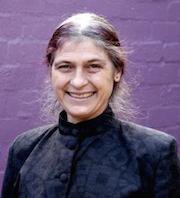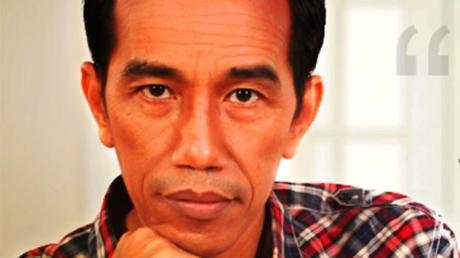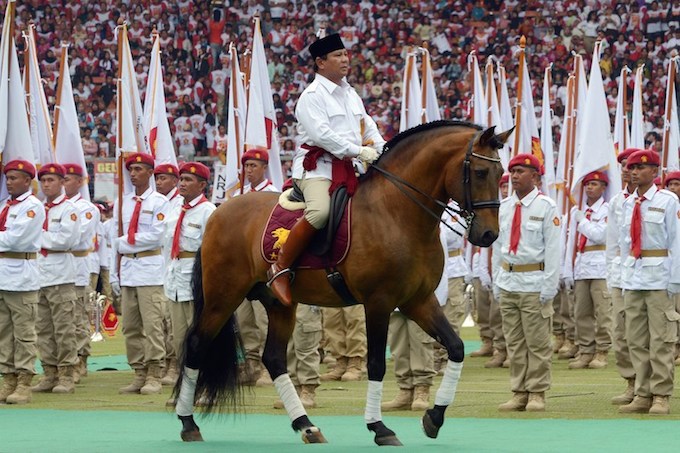Prabowo Subianto Djojohadikusumo and his rival candidate for the presidency, Joko Widodo (Jokowi), come from very different backgrounds. Where Jokowi has had a meteoric rise from humble beginnings and relative obscurity, Prabowo was born into Indonesia’s political elite.
His grandfather, Margono Djojohadikusomo, was the founder of Bank Negara Indonesia (then Indonesia’s reserve bank), the first leader of Indonesia’s provisional advisory council (Dewan Pertimbangan Agung Sementara) and a member of the historic Committee for Preparatory Work for Indonesian Independence (Badan Penyeledik Usaha Persiapan Kemerdekaan Indonesia), which laid the foundations for the new republic in 1945. His uncle was a hero who died in the revolutionary struggle against the Dutch in Yogyakarta. His father, Sumitro Djojohadikusumo, was an economist, diplomat, university professor and government minister in both Soekarno’s Old Order and Soeharto’s New Order. The suffix ‘kusumo’ on the family name usually indicates Javanese nobility.
Early Years
Prabowo was born in Jakarta in 1951, but at the age of about five his family went overseas in self-imposed exile as a result of involvement with the unsuccessful PRRI-Permesta rebellion (where a number of provinces in Sumatra and Sulawesi attempted independence from the central government in Jakarta). Prabowo lived for three years in Singapore, and two years each in Malaysia, Hong Kong, Switzerland and England, graduating from high school in London in 1967, at the age of 16.
Then, in 1967, his family returned to Indonesia, by then under the rule of President Soeharto. Sumitro Djojohadikusumo became the Minister for Trade (1968-73) and Minister for Research and Technology (1973-78).
Military Career
Prabowo enrolled in Indonesia’s Military Academy in Magelang in 1970, graduating in 1974, the same year as now-President Susilo Bambang Yudhoyono. In 1976 he was assigned as a commander, with the rank of First Lieutenant, of a group (Komando Pasukan Sandhi Yudha, or Kopassandha) in Indonesia’s Nanggala Operation in East Timor. Under Prabowo, this group was allegedly involved in the killing of the first Prime Minister of East Timor (and vice president of Fretilin, the East Timorese liberation movement), Nicolau dos Reis Lobato.
Three years later, Prabowo participated in anti-terrorist training at Fort Braggs in America, after which he undertook further training in West Germany in 1981, earning the accolate 'Best Graduate'. Two years later, in 1983, he became a Vice-Commander of the powerful Special Forces (Kopassus), married Soeharto’s daughter, Siti Hediati Harijadi (known as ‘Titiek’), and was sent on another operation to East Timor.
In 1993, Prabowo was involved with attempts to crush the East Timorese independence movement by using irregular troops (hooded ‘ninja’ gangs dressed in black, which operated at night). These troops were trained by Kopassus. Many human rights abuses involving such militias have been recorded from that period.
In 1996, Prabowo was also involved in the Mapenduma Operation, supported by the British, to rescue hostages held by the Free Papua Movement. Controversy arose because the group allegedly used a Red Cross emblem on a white helicopter, which led villagers to run toward the helicopter, upon which they were shot dead.
In 1997, while still with Kopassus, Prabowo was implicated in the kidnapping and torture of nine pro-democracy activists. He has since admitted his involvement in these events. By 1998 Prabowo was the head of the strategically vital Jakarta-based garrison, Kostrad, which had been under Soeharto’s command in 1965, when riots broke out. While the exact origin of these has not been proven, it is believed by many that they may have been, at least in part, the result of an internal military struggle between Prabowo and the Indonesian Military Commander, Wiranto. In the wake of the events of 1997-98, Prabowo was first transferred to a non-combatant role, and then discharged from military service by a military ethics council (Honour Board).
Jordan
After discharge from the army, Prabowo lived in Jordan for three years, at the invitation of King (then Prince) Abdullah II. Prabowo and King Abdullah had undergone military training together in both America and Germany. In this period, Prabowo also spent time in Germany but was refused entry to both the United States of America and the United Kingdom because of his controversial past military activities.
In 2001, Prabowo and Titiek divorced. Titiek had been living in the United States with their son, Didit Hediprasetyo.
Business Career in Indonesia
On his return to Indonesia in 2000, Prabowo involved himself in business with the support of his younger brother, Hashim Djojohadikusumo, a wealthy businessman. Prabowo bought Kiani Kertas, a paper pulp and plantation company, formerly owned by Bob Hasan, a crony of President Soeharto. This company was rebranded Kertas Nusantara and a number of companies were then formed under the umbrella, Nusantara Energy, which ranged across the pulp industry, forestry, agriculture, mining, commercial fishing and professional services. Nusantara Energy employs about 10,000 people and has total assets of US$10 billion.
Politics
In 2004 Prabowo emerged as a presidential candidate for Golkar, the party of former President Soeharto, but was eliminated early in the selection process. Prabowo then employed two American media consultants, Alex Castinallos and David Axelrod, to help improve his image. His campaign team also conducted research into the kind of presidential figure voters were looking for, and developed strategies around which organisations Prabowo would need to approach.
In this early period Prabowo also sought to establish grassroots credentials. He became the President of the Indonesian Farmers’ Association in 2004 (and was elected in 2010 for a second term) and in 2008 he became President of the Indonesian Traditional Market Traders Association (APPSI), as well as being elected President of the Indonesian Pencak Silat (martial arts) Association in 2004 and 2012.
In the meantime, Prabowo liaised with close associates, including Fadli Zon and Suhardi, to set up a new party, Gerindra (Gerakan Indonesia Raya, Greater Indonesia Movement). In July 2008, once the party was set up formally, Prabowo resigned from Golkar.
It was therefore as head of Gerindra that Megawati Soekarnoputri nominated Prabowo as her Vice-Presidential candidate, when she stood for President in the 2009 election. The pair lost to the Susilo Bambang Yudhoyono-Boediono coalition. The same party alliance also formed for the election of Jokowi and Ahok (Basuki Tjahaja Purnama) as Governor and Deputy Governor of Jakarta. Jokowi was backed by Megawati’s PDI-P (Partai Demokrasi Indonesia – Perjuangan, the Indonesian Democratic Party – Struggle) and Ahok was backed by Gerindra. The temporary alliance between PDI-P and Gerindra, forged over the past few years, is now off as Jokowi and Prabowo fight for the top position as President of the country.
Prabowo as President?
Prabowo has developed qualities and a reputation in his former careers in the military and business. Prabowo is likely to be a ‘strong man’ politician, as Dominic Berger (http://asiapacific.anu.edu.au/newmandala/2014/05/27/prabowo-and-the-art-of-being-tegas/) describes, in both the positive (being decisive) and negative (machismo) senses.
Gerry van Klinken (http://www.insideindonesia.org/current-edition/prabowo-and-human-rights) comments the ‘people of Indonesia should hope that military indifference to human life won’t be carried into the presidential palace after 9 July’.
Prabowo is advocating support for labour rights, as Teri Caraway and Michele Ford (http://www.eastasiaforum.org/2014/05/14/labour-unions-divided-by-indonesias-presidential-elections/) comment, ‘signalling his commitment to workers, farmers, fishers, teachers and small traders, as a ‘soldier of the Indonesian people’ – although 'what such a commitment would translate into if he wins office is an open question’. They comment that a few unionists are supporting Prabowo, creating division within the union movement.
Prabowo is a firm nationalist, and as Aboeprijadi Santoso comments (http://www.insideindonesia.org/weekly-articles/gerindra-and-greater-indonesia) where a decade ago he was quoted as saying there were only three paths to power – Islam, the military and being close to Soeharto – now he has adopted ‘hyper-nationalist symbols’, emphasising both the red-and-white nationalist flag, and a new ‘three-dimensional’ garuda (the Indonesian mythical eagle-like bird).
John Roosa (http://asiapacific.anu.edu.au/newmandala/2014/05/26/sukarnos-two-bodies/) concurs with Santoso’s opinion, commenting that both Prabowo and Jokowi invoke Soekarno, but in very different ways. Prabowo condemns ‘liberal democracy’ and copies Soekarno’s ‘anti-imperialism’, while Jokowi has borrowed a formula (Trisakti – three kinds of sacred power) for Indonesia to be ‘standing on its own feet’ in politics, economics and culture.



